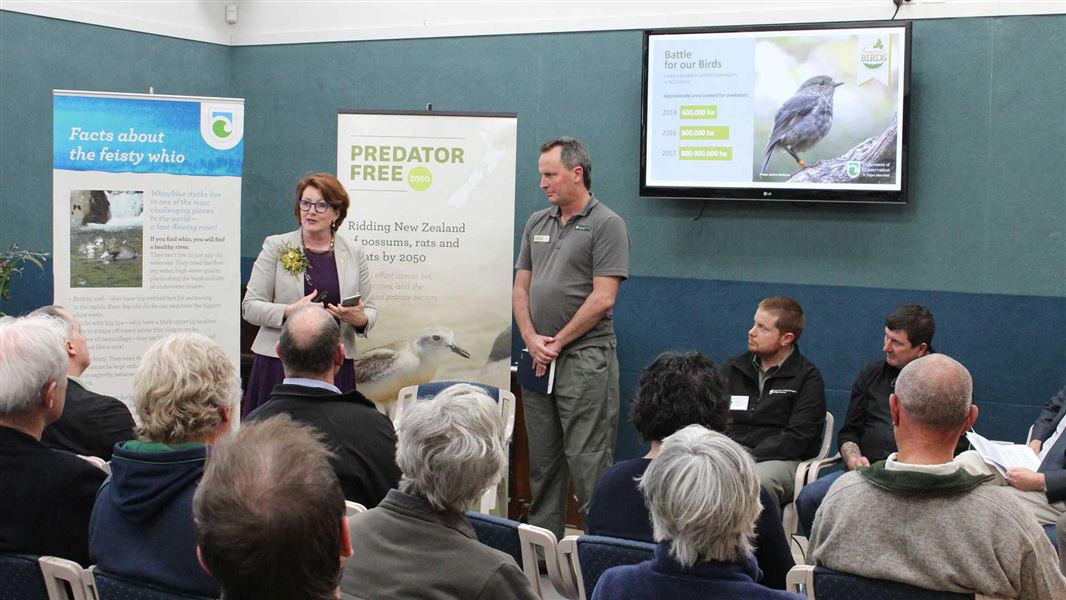Archived content: This media release was accurate on the date of publication.
Date: 14 September 2017
Manawatu residents were encouraged to join the Predator Free 2050 movement by Conservation Minister Maggie Barry during a community meeting held in Palmerston North on Friday 8 September.
During the meeting, Minister Barry spoke about the Predator Free 2050 vision. She described it is an ambitious programme to rid New Zealand of three of our most damaging introduced predators - possums, rats and stoats - by 2050.
“It will deliver huge benefits for the social and cultural links with our environment, for our regional economies through primary industries and tourism and for our threatened native species.
“Achieving this goal will require new technology and a coordinated and collective impact of individuals, communities, central and local government, iwi, OSPRI, philanthropists, non-government organisations, businesses, science and research organisations and land owners.”
The meeting was attended by around 50 people including representatives from Horizons Regional Council, Palmerston North City Council, Wellington Conservation Board, Rangitaane o Manawatu, and a range of stakeholder and community groups such as, Forest and Bird, Enviroschools, Fish and Game, the Ruahine Whio Collective, Moonshine Valley, Ashhurst volunteer stoat trapping group and a host of other community-led trapping projects and DOC volunteers.
The event consisted of presentations about Predator Free 2050 from the Minister, Lower North Island Predator Free Ranger Jim Flack, and guest speaker Councillor Pat Kelly from Horizons Regional Council. Highlights included a Q&A session with the Minister, predator trap displays, and an impressive afternoon tea spread.
In the wider Manawatu district, a lot is already being done by the community and there is a lot of enthusiasm for the prospect of a pest free New Zealand.
Nicole Sutton, Senior Ranger Community for DOC’s Manawatu District says, “There are a number of great trapping projects that rely on community involvement and dedicated volunteers such as those in Ruahine Forest Park, our coastal reserves, Te Apiti Manawatu Gorge and the Moonshine Valley.
“The Predator Free 2050 initiative helps make advice and resources more accessible to groups and individuals interested in undertaking animal pest control. It encourages those involved to have a shared voice, and inspires others to take part,” says Ms Sutton.
Check out the Predator Free 2050 website or contact your local DOC or Horizons Regional Council office for opportunities to become involved.
Further information
Predator Free 2050 is an ambitious goal to rid New Zealand of the most damaging introduced predators that threaten our nation’s natural taonga, our economy and primary sector.
Ridding New Zealand of possums, rats and stoats by 2050 is a New Zealand-wide goal. It will require new techniques and a co-ordinated team effort across communities, iwi, and the public and private sectors.
Predator Free 2050 will deliver huge benefits across New Zealand – for the social and cultural links with our environment, for our regional economies through primary industries and tourism and for our threatened native species.
Connect with your region's Predator Free Ranger Jim Flack. Jim can give you advice on tools, best practice and safety information.
Contact
Nicole Sutton, Senior Ranger Community, DOC Manawatu District
Email: nsutton@doc.govt.nz
Phone: +64 350 9722
Jim Flack, Lower North Island Predator Free Ranger
Email: jflack@doc.govt.nz
